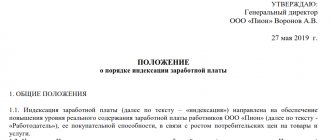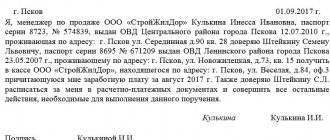Grounds for salary indexation in 2022
Indexation is an increase in the current salary by a certain coefficient, carried out to maintain workers’ earnings at a decent level in the face of constant rising prices.
The basis for applying the salary indexation coefficient is the growing indices of inflation and consumer prices, which are calculated by Rosstat and regularly published on its official website. Consumer price indices are determined not only for Russia as a whole, but also for each region of the country separately. In this case, you can focus on the indicator of a certain period (for example, at the end of the last year), or on its monthly dynamics.
The growth of the regional cost of living and the minimum wage also influence the employer’s decision to index wages in the organization.
Due to the fact that the procedure for carrying out indexation is not defined at the legislative level, there is a misconception that it concerns only the public sector of the economy, but this is not so.
The provisions of the Labor Code (Articles 130 and 134 of the Labor Code of the Russian Federation) and Rostrud oblige all employers to index wages at the end of the year if an increase in consumer prices was recorded in the country. The letter of Rostrud dated December 26, 2017 No. 14-3/B-1135 directly states that failure to index wages entails its payment not in full, and this is a violation of labor legislation, namely, the provisions of Art. 22 and art. 136 of the Labor Code of the Russian Federation, for which the employer will have to bear responsibility under Part 1 of Art. 5.27 of the Code of Administrative Offenses of the Russian Federation: the fine for a company will be from 30,000 to 50,000 rubles, and for its director - from 1,000 to 5,000 rubles.
Rostrud calls on workers whose legal demands to review their earnings are violated to defend their rights in the courts.
Index value for 2022
What will the indexation coefficient be from February 1, 2022? According to Decree of the Government of the Russian Federation dated January 26, 2018 No. 74 “On approval of the amount of indexation of payments, benefits and compensation in 2018”, its size is 1.025.
The indexation coefficient is calculated based on the forecast value of the consumer price index. The value of the indicator for 2022 was established according to the forecast of socio-economic development of Russia and as a base option for the planning period of 2022 and 2020. According to the calculation, the projected consumer price index is 103.2%. Thus, the indexation of social benefits for 2022 will be carried out by this coefficient.
Indexation of salaries for public sector employees
By Order of the Government of the Russian Federation dated December 6, 2017 No. 2716-r, from January 1, 2018. From the federal budget, the salaries of all employees of budgetary, state and autonomous institutions, government agencies and other federal institutions, as well as civilian personnel of military units are indexed by 4%.
In 2022, the “moratorium” on indexation of salaries for civil servants listed in Art. 4.3 of Law No. 68-FZ dated 04/06/2015 (military, judges, civil servants, etc.). This year, indexing the earnings of all state employees mentioned in the so-called. “May decrees” of the President of 2012, prescribing a significant increase in their income by 2022 (for example, decree No. 597 dated 05/07/2012), should be 4.1%.
The earnings of those public sector workers who were not mentioned in the “May decrees” will also be indexed, President Putin himself stated this. For example, in this regard, the mayor of Moscow adopted a resolution dated November 28, 2017 No. 917-PP - according to it, wages will be indexed from January 1, 2022 for employees of Moscow government agencies who were not included in the presidential decrees on the growth of budget salaries.
How to force an employer to index wages?
This question is often asked to Rostrud. The answer is predictable - file a complaint with the state labor inspectorate, as well as with the court.
At the same time, you can contact the State Tax Inspectorate electronically - through the Rostrud service.
By the way, the Federation of Trade Unions insists on establishing in labor legislation and social partnership documents specific terms and amounts for wage indexation , ensuring an increase in the level of real wages.
It is possible that sooner or later amendments will be made to the Labor Code and the indexation process will be spelled out more clearly.
Salary indexation in commercial organizations 2018
If the issue of indexation of salaries for public sector employees is decided at the state level, then in commercial companies the indexation of salaries for employees is established in a collective agreement, agreement, salary regulations, or other local regulation, as well as in the employment contract with the employee.
The law does not allow a commercial employer to deprive employees of guarantees and refuse to index wages on the basis that this obligation applies to public sector employers. Mandatory wage indexation is the obligation of any employer towards those working under an employment contract, even if it does not have a corresponding internal regulation. The Constitutional Court of the Russian Federation has repeatedly recalled this in its rulings (for example, rulings of the Constitutional Court of the Russian Federation dated June 17, 2010 No. 913-О-О; dated November 19, 2015 No. 2618-О), and Rostrud in a letter dated April 19, 2010 No. 1073-6- 1 indicated that in the absence of internal acts on indexation, the employer must develop such or make changes to existing provisions.
The employer must decide in what order the salary indexation will be calculated at his enterprise. It is necessary to determine the indicator to focus on when increasing salaries - the inflation rate, the cost of living, the consumer price index, etc., and the period for which it will be taken into account. The selected indicators and methodology for calculating the indexation coefficient are reflected in the relevant internal act and in employment contracts.
Example
The company decided to index salaries using the consumer price index (I) - 102.5%. The calculation is made using the formula: Salary x (I: 100).
That is, an employee’s salary, for example, equal to 20,000 rubles, after indexation will be:
20,000 rub. x (102.5%: 100) = 20,500 rub.
The next indexation of employee salaries is formalized by order of the organization, indicating:
- reasons for indexation (price increases, inflation, etc.),
- indicator that will be used for calculation,
- the date from which the salary increase is made.
Sample order for salary indexation in 2022 in a commercial organization:
| Limited Liability Company "Albatross" ORDER No. 5-K Moscow 01/09/2018 In accordance with Art. 134 of the Labor Code of the Russian Federation, clause 8 “Regulations on wages in Albatros LLC”, and in connection with the increase in the consumer price index I ORDER:
General Director Losev Losev L.V. I have read the order: Chief accountant Ivanova Ivanova A.A. |
What is indexing?
Indexation is a procedure designed to preserve the purchasing power of workers. In those institutions that belong to the state (half of the enterprise or more), we are talking about a planned salary increase.
As for commercial organizations, their owners decide more. But this does not mean that they may not carry out indexation at all and violate the rights of workers. If the management of an enterprise abuses its right to independently determine the terms of indexation and constantly delays this procedure, then employees can sue it. And with the help of experienced lawyers who are well versed in labor law, they will not only force the company to carry out indexation, but will also receive compensation for previous years.
Please note that indexation is different from salary increases. The key point is that thanks to the first, the employee’s real earnings remain the same, only the numbers change. In the second case, he is able to afford to buy much more.
Indexation can be progressive, that is, working with data on expected future inflation, as well as regressive, when the employer is guided by the figures that have already been officially announced. In any case, you need to rely on specific, credible sources. And what specific method the employer chose must be enshrined in the local regulatory act that regulates indexing. Most often this is a separate provision. But in general, such a procedure can be provided for in a collective labor agreement.
Indexation of wages in the non-budgetary sphere - what in practice
In the absence of local acts on the indexation procedure, the court can, at best, oblige the employer to establish such a procedure in its organization, and at worst, apply a fine in accordance with the provisions of Art. 5.27 of the Code of Administrative Offenses of the Russian Federation (for example, the ruling of the Investigative Committee of the Moscow Regional Court dated September 21, 2015 in case No. 33-22551/2015, the decision of the Moscow City Court dated September 18, 2015 No. 7-9856/15).
As for the claims of employees to pay them under-accrued wages, here the courts are not always on the side of the plaintiffs - if the provisions on indexation indicate the conditions under which it is impossible (for example, the company has financial problems), the court will most likely take the employer’s side. It is also necessary to take into account the opinion of the Supreme Court of the Russian Federation, which believes that when ensuring wage growth in ways other than indexation (increasing salaries, bonuses, etc.), the employer may not carry it out (clause Review of Judicial Practice No. 4 (2017) RF Armed Forces, approved November 15, 2017).
So will wages for employees of commercial firms increase in 2018?
The latest indexation news is not encouraging yet: deputies have repeatedly tried to make changes to Art. 134 of the Labor Code of the Russian Federation, more clearly spelling out the obligation of businessmen to annually index the salaries of their employees, excluding those whose income exceeded 10 times the subsistence level. It was also proposed to legislatively establish the minimum amount of wage indexation by region - not lower than the approved minimum consumer price index (for example, bill No. 1119655-6). So far, all the bills introduced by the State Duma have been rejected, but given the active position and explanatory activities of Rostrud, it seems that this topic will not be closed and the Labor Code of the Russian Federation will finally be supplemented with new provisions on wage indexation in the commercial sphere. You can find more complete information on the topic in ConsultantPlus. Free trial access to the system for 2 days.
What's happening in the present?
Wage indexation in 2022 took place as usual, although with some May adjustments caused by the difficult economic situation in the country. As a kind of compensation for a number of employees, the recalculation of salaries was postponed to January 1, 2022. It was on this date that indexation of 4% was planned. The same event is planned to be held every year until 2020 inclusive. However, as practice has shown, plans can change.
Employer's liability
The employer's liability in connection with indexation directly depends on what exactly he violates. If the terms of the collective labor agreement are met, then he faces either a warning or a fine in the amount of 3 thousand rubles and up to 5. Also, the lack of indexation can be considered a violation of labor legislation. And this means that officials can be fined from 1 to 5 thousand, and a company - from 30 to 50. Those who are engaged in business without forming a legal entity are in this case equated to officials.
In addition, if an employee applies to the court to protect his rights, the latter can carry out indexation himself by force. Moreover, there is a possibility that the employer will recalculate all payments for previous years. Plus, the employee has the right to count on compensation. But the chances of achieving such an outcome are greatest when an experienced lawyer takes part in the proceedings.
When should an employer not index?
Please note that indexation does not apply to relationships formalized under a civil contract. This is why you need to carefully watch what you sign. Otherwise, you risk losing the right to protection guaranteed under the Labor Code of the Russian Federation.
The law obliges the employer to index wages
IMPORTANT! A sample of the Regulations on the procedure for indexing wages from ConsultantPlus is available at the link
The law affirms the absolute obligation of the employer to promote the welfare of its employees and the adequacy of the real content of wages. Art. 134 of the Labor Code of the Russian Federation calls indexation a direct duty of any employer, no matter in what area it operates - budgetary or commercial.
Thus, there can be no discrepancies here - the employer is imperatively required to carry out indexing. However, the provisions of this article do not allow for its unambiguous interpretation. So, from them it is impossible to draw an exact conclusion about:
- timing of indexation;
- its frequency;
- salary indexation procedure.
Since the indexation procedure is not prescribed in basic laws, it must be regulated by employers in internal regulations:
- when concluding employment contracts (individual and collective);
- when drawing up any agreements, including amendments to contracts;
- in a separate local regulatory act;
- in the industry agreement.
ATTENTION! If the enterprise does not have a document with indexation regulations or its mechanism is not mentioned in the text of the employment contract or collective agreement, this does not relieve the employer of obligations before the law. The document must be developed or changes and additions must be made to existing acts. The absence of such provisions is a direct violation of the requirements of the Labor Code.
Since modern labor legislation in terms of regulating indexation is imperfect, bills are being introduced calling for changes to a number of ambiguous formulations aimed at creating a more precise concept of the wage indexation procedure and its imperativeness.
03/01/2022 On increasing wages for public sector employees in Russian regions - latest news
03/01/2022 Latest news about salary increases for public sector employees (state and municipal employees) in 2022 - read BELOW.
In accordance with Decree of the President of the Russian Federation dated June 24, 2019 N 288 “On the main directions of development of the state civil service of the Russian Federation for 2022 - 2022”, the need is spelled out in the current year to ensure, as part of the implementation of measures to improve the remuneration system for civil servants, optimization of the pay structure civil servants (without reducing its level) by gradually increasing the share of official salary in the structure of this content and a corresponding increase in the size of the long-service pension. As a rule, changes in salary calculations for public sector employees (state and municipal employees) occur during the period of April 1, June 1 and October 1 of the current year, when the responsible federal executive authorities need to inform the President of the Russian Federation about the progress of implementation of this Decree. In this regard, the Budget of the Russian Federation for the period 2021-2022. it is stipulated that employees of Russian departments and institutions should expect a salary increase in 2022 - by an average of 6.8%. Read below about the nuances and latest news about new forms of calculating salaries for public sector employees. — For employees of budgetary organizations, which are mentioned in the May decrees, wages are indexed from January 1. These include, in particular, teachers and doctors. State employees who are not included in the May decrees will have their salaries increased starting October 1. The size of the increase depends on the increase in consumer prices,” said Sergei Bolotin, a lawyer at the European Legal Service. According to him, this year indexation could be approximately 4%. At the same time, the issue of indexing the salaries of federal-level civil servants - the judiciary, senators and deputies of the State Duma - was resolved in a special way, reports news.mail.ru
As the Parliamentary Gazette reports, regardless of the region and institution in which public sector and municipal workers work, they will begin to receive the same salaries in 2022. Instead of regional authorities, the requirements for sectoral wage systems will now be established by the Government. President Vladimir Putin signed the corresponding law. It is planned to introduce the new payment system in stages in 2021-2025, and the Government will indicate specific dates for the transition to the new system for each industry. As Valentina Kabanova, deputy chairman of the State Duma Committee on Labor, Social Policy and Veterans Affairs, explained to Parliamentary Newspaper, the new salary calculation scheme includes a base rate and a tariff scale of 18 categories. According to the law, the Cabinet of Ministers will regulate the differentiation of salaries and rates of public sector employees, as well as determine compensation and incentive payments and the conditions for their appointment. “This will make it possible to harmonize the terms of payment for workers in the same field in different regions,” Deputy Head of the Ministry of Labor Andrei Pudov previously explained the essence of the amendments. Each industry must have its own requirements. It is expected that the by-laws will also indicate the share of guaranteed salary payments. The Ministry of Labor believes that the salary should be 50-70 percent of the salary. At the same time, the first deputy head of the United Russia faction in the State Duma, Andrei Isaev, stated earlier that the faction believes that at least 70 percent of the salary of public sector employees should be salary. Valentina Kabanova, in an interview with Parliamentary Newspaper, emphasized that the upcoming equalization of wages will not lead to the fact that “somewhere public sector employees will receive less than now.” The deputy added that new salaries should take into account the cost of living in the regions and other local features. What do public sector employees' salaries consist of: basic salary; bonus, which is assigned individually, but not less than 5%; additional payments for hazardous work, for working on weekends and holidays, for overtime; bonus for academic degree and title; for long experience - from 10% to 30%; and other additional payments. The total additional payment can reach 60% of the salary, in some cases - 120%. In addition, public sector employees can receive financial assistance in the amount of 30% of the salary and assistance for health improvement - 50% of the salary. Teachers' salaries should be different At Vladimir Putin's press conference on December 17, the question was raised that after the minimum wage was raised to the subsistence level, the salaries of cleaners in schools were closer to the salaries of teachers. In this regard, the President instructed the Government to review the level of salaries of Russian teachers. Commenting on the order, Andrei Isaev said that the party intends to discuss with the Cabinet of Ministers the issue of “strengthening differentiation in the public sector depending on the qualifications and working conditions of the employee.” “This difference, the “accordion” in the incomes of qualified and unskilled workers in the public sector, has shrunk,” Isaev explained to reporters. Therefore, according to him, cleaners and nurses began to receive the same amount as qualified specialists. Earlier, the Parliamentary Newspaper wrote that the minimum wage in 2022 will for the first time exceed the subsistence level for the working population. This will affect 3.9 million Russians. At the same time, the achieved target ratios in the salaries of categories of public sector employees, provided for by the “May Decrees” of the President of 2012, will be maintained. WHAT WAS THE SITUATION WITH SALARY OF STATE EMPLOYEES IN 2022 The indexation of wages from October 1, 2022 was planned at 3.8%. However, inflation for 2022 was 3%, so this is how much salaries will be increased. But not everyone does, reports the Argumenty i Fakty newspaper. “The salaries of civil government employees, that is, employees of ministries and departments, will increase,” answered the Vice-Rector of the Financial University under the Government of the Russian Federation, Alexander Safonov. “In addition, the pay of military personnel and security forces - employees of the Ministry of Internal Affairs, the Ministry of Emergency Situations, the FSB, the Foreign Intelligence Service, the Federal Security Service, the Russian Guard, the Investigative Committee and the Prosecutor General's Office will be increased by 3%. As Deputy Prime Minister Tatyana Golikova said, on October 1 the salaries of public sector employees who were not included in the May 2012 presidential decree will also be increased. That is, there will be no mass indexation of salaries of health workers, teachers, pedagogues and other “ordinary” public sector employees this year. Now the salaries of public sector employees are calculated by local authorities and municipalities. In fact, these functions are often entrusted to the shoulders of the heads of organizations, which leads to a gap in salaries not only in different localities, but even in neighboring enterprises of the same city. To correct the injustice, the Cabinet of Ministers plans to establish the same requirements for establishing salaries, rates and bonuses, which are used when calculating salaries, compensation and incentive payments. At the same time, the government will approve the requirements for each area of activity, and will also issue a deadline during which the salaries of public sector employees will be recalculated in a new way. What have you heard about layoffs of civil servants and state employees? At the same time, the increase in salaries of public sector employees in 2022 is associated with the planned large-scale reduction of civil servants at the federal, regional and municipal levels. You can read below about who will be laid off and how, approximately. For 2022, Russia actually plans to implement a reform in the field of public administration, which will lead to a large-scale reduction in the army of civil servants and an increase in the salaries of those remaining, First Deputy Minister of Finance Tatyana Nesterenko said in an interview with RIA Novosti. According to her, if this is not done, then the salaries of officials in the future will be indexed only to the level of inflation, since in order to increase wages to a competitive level, all civil servants will need an additional hundred billion rubles a year from the budget. “Savings is not the end in itself of the reform, obviously. But the funds released in this case will be used to increase wages for civil servants. If the planned reduction is not carried out, a competitive level of wages in the civil service will not be achieved,” Nesterenko said. The reduction of the state apparatus, according to the Ministry of Finance, will take place in two stages. First, “automatically”: next year the number of central offices of federal executive bodies will be reduced by ten percent, territorial bodies by five percent, and by 2021 this figure in the regions will reach 15 percent. At the second stage, it is expected that the state apparatus will be structurally improved, which will lead to an additional reduction in numbers. At this stage, the territorial bodies of ministries and departments are transformed into branches without the status of a legal entity and without divisions. “That is, we plan to create compact front offices in which departments involved in resolving issues of organizational, information, documentation, financial and economic, administrative and economic support of activities will be abolished,” Nesterenko explained. Experts have ambivalent approaches to explaining the actions of the Ministry of Finance. Vice-President of the Confederation of Labor of Russia, deputy of the State Duma of the Russian Federation Oleg Shein, in a conversation with FederalPress, avoided answering about the planned reduction in executive authorities, citing the fact that “it is impossible to comment on whether this will happen at all.” “I cannot comment on this, because we are eyewitnesses of the thirtieth or fortieth statement of the Ministry of Finance on this topic. I would not say that we see any realistic changes as a result of these statements. It is impossible to comment on the same people, the same words, year after year,” Shein said in a conversation with a FederalPress columnist. Pavel Salin, director of the Center for Political Science Research at the Financial University, also doubts the prospects for large-scale cuts. “I would not draw far-reaching conclusions here. In my memory, there have been five to seven widely announced reductions over the past 20–25 years. As a result, this, at a minimum, did not lead to a real reduction in the number of civil servants, but at most led to their increase,” Salin said. According to him, if the plans announced by the Ministry of Finance reach the implementation stage, then it will not be employees who will be cut first, but unfilled positions in departments. “Despite the myth about the attractiveness of the civil service, quite a lot of positions are not filled for a number of reasons, and when it comes to layoffs, management always resorts to a proven method. It cuts not the people who work, but the rates that are not occupied,” Salin noted. Personnel issue The policy of reducing civil servants raises a lot of questions among some experts. The statement made by the Deputy Minister of Finance of the Russian Federation became an occasion to speculate on the criteria that the Cabinet of Ministers will use to dismiss employees. As it turned out, not all departments currently have a sufficient number of specialists. “For example, the staff of the Department of Metallurgy and Materials of the Ministry of Industry and Trade of Russia can hardly be called large, much less bloated, and yet its employees have to solve a bunch of problems associated with a huge metallurgical complex. If its number decreases, then the remaining employees in the literal sense of the word can “sew up” under the burden of the issues being resolved, working to their limits,” said industrial expert Leonid Khazanov, adding that in Soviet times, metallurgy was supervised by two departments at once - the Ministry of Ferrous Metallurgy of the USSR and Ministry of Non-ferrous Metallurgy of the USSR, each of which had a large staff of specialists. Political strategist Marat Bashirov pointed out that in order to reduce civil servants, a deeper approach is needed, related to the analysis of duplicating or unnecessary functions, which, according to the expert, is not discussed now. “You and I hear that there is an idea to implement a “regulatory guillotine.” It implies a reduction in control functions, but in addition to control functions, government agencies still have various functions that, in my opinion, need to be abandoned. We understand that the refusal of functions causes a real reduction in the state apparatus. Accordingly, if a person is not useful, then this function must be abandoned, and the person either fired or reassigned,” said Bashirov. Who's on the layoff list? If the large-scale cuts announced by the Ministry of Finance do take place, then the main criterion for them will probably be the efficiency of employees. Director of the Institute of Business and Business Administration of RANEPA Sergei Myasoedov spoke about this. “From my point of view, this reform should affect those who work poorly... Recently, our president has set a radical task of increasing labor productivity, because, again, Russia is one of the most lagging countries in Europe in terms of productivity. There are a lot of people, but the effect of their activities is small,” Myasoedov explained, adding that those who have the highest KPI indicators will remain in office. According to political scientist Marat Bashirov, with the current approach, low-paid employees may be left without work. “Usually it looks like this: there is an order for the ministry, for example, to reduce 10% of the number. If you don't put audit mechanisms in place, and here, obviously, a simple 10% reduction will be proposed, then it doesn't matter who you fire. Each ministry will be looking for someone who, from its point of view, should be fired or can be fired. Usually these are the lowest paid employees, the lowest grade,” explained Bashirov. According to him, this will not bring large budget savings, but will contribute to the “washing out” of the layer of civil servants who are engaged in “preparing numerous materials, reports, certificates, and so on for higher authorities.” “We know that for the majority of people who work as directors of departments, directorates, and even more so as deputy ministers and ministers, their entire working day is either work meetings or meetings. They really don’t prepare the internal context or content. This is done by lower-level workers,” said Bashirov. As the expert noted, the weakening of this layer of civil servants could in the future lead to a weakening of the state apparatus and a decline in the quality of public administration as a whole. State trick? A reduction in civil servants does not always mean a reduction in people employed in public administration. There is a possibility that dismissed employees will simply move to subordinate institutions that are directly managed by the ministries. “Podvedy” usually receive money for the implementation of projects from the same federal budget. It turns out that the federal budget will pay the same money, only from a different pocket. This is a well-known trick, and it is simply impossible to fight it. Real reduction can only happen when you cut redundant or unnecessary functions,” said Marat Bashirov. However, it is likely that other outsourcing schemes will be used. Sergei Myasoedov is sure that this is a completely positive phenomenon. “We can say that officials are mimicking and will try to stay at the cost of the state, still using their close connections for some time. This is the negative side. But there is a positive side: people offering their services will go through a tender procedure, and despite all the shortcomings of current tenders, the procedure is still competitive and several people will go through the tender, accordingly, outsourcing services are a public-private partnership,” – Myasoedov said, adding that this concept will increase the quality of services provided. Where will the laid-off civil servants go? First Deputy Chairman of the RF State Duma Committee on Labor, Social Policy and Veterans Affairs Mikhail Tarasenko is confident that laid-off civil servants will not be left without work in the future: “These people who work there will probably not go into blue-collar jobs, but these are sufficiently trained people who will find a place in life, because, as it seems to me, we have too many vacancies today.” Experts have made more radical predictions. According to Sergei Myasoedov, director of the Institute of Business and Business Administration of RANEPA, the large-scale reduction of civil servants is a reason to intensify the policy of retraining old personnel so that they can master professions or engage in small and medium-sized businesses. “I think that another category will appear that needs to gradually adapt to a market and entrepreneurial mentality: learn not to sit on the neck of the state, to “eat up” the state budget, but to work effectively. New categories will appear that will need to be retrained so that people can become self-employed,” Myasoedov said. If the process of reforming the state apparatus actively starts working, then in 2022 personnel cuts will affect not only employees of federal departments, but also regional (municipal) government bodies in all constituent entities of the Russian Federation: Adygea, Altai, Bashkiria, Buryatia, Dagestan, Ingushetia, Kabardino-Balkaria, Kalmykia, Karachay-Cherkessia Republic , Karelia, KOMI, Crimea, Mari El, Mordovia, Sakha (Yakutia), North Ossetia (Alania), Tatarstan, TUVA, Udmurtia, Khakassia, Chechnya, Chuvashia, Altai Territory, Transbaikal Territory, Kamchatka Territory, Krasnodar Territory, Krasnoyarsk Territory, Perm Territory, Perm Territory, Primorsky Territory, Stavropol Territory, Khabarovsk Territory, Amur Region, Astrakhan Region, Arkhangelsk Region, Belgorod Region, Bryansk Region, Vladimir Region, Volgograd Region, Vologda Region, Voronezh Region, Ivanovo Region, Irkutsk Region, Kaliningrad Region , Kaluga region, Kemerovo region, Kirov region, Kostroma region, Kurgan region, Kursk region, Leningrad region, Lipetsk region, Magadan region, Moscow region, Murmansk region, Nizhny Novgorod region, Novgorod region, Novosibirsk region, Omsk region, Orenburg region, Orel region, Penza region, Pskov region, Rostov region, Ryazan region, Samara region, Saratov region, Sakhalin region, Sverdlovsk region, Smolensk region, Tambov region, Tver region, Tomsk region, Tula region, Tyumen region, Ulyanovsk region, Chelyabinsk region, Yaroslavl region, cities of federal significance - Moscow, St. Petersburg, Sevastopol, Jewish Autonomous Okrug, Khanty-Mansi Autonomous Okrug, Yamal-Nenets Autonomous Okrug, Nenets and Chukotka Autonomous Okrug.
01.03.2022 12:13
How do wages increase when salaries are indexed?
As a result of indexation, salaries (official salaries, wage rates) of employees of institutions and civil servants increase. Amounts are subject to rounding upward to the nearest whole ruble. After indexation to the salary, all established payments are recalculated based on the new salary, taking into account its increase. Thus, the amount of compensation and incentive payments increases.
Example 1.
In a government institution, as of October 1, 2019, salaries were indexed to 1.043. Let's assume that the employee's salary before the promotion was 10,000 rubles. Additionally he was paid:
– monthly bonus (10% of salary); – bonus for length of service (10% of salary); – bonus for complexity and intensity of work (5% of salary); – bonus for quality of work (15% of salary); – bonus according to the regional coefficient (15% of wages).
The amount of all payments, taking into account the salary increase, will be 10,430 rubles. (RUB 10,000 x 1,043):
– monthly bonus – 1,043 rubles. (RUB 10,430 x 10%); – bonus for length of service – 1,043 rubles. (RUB 10,430 x 10%); – bonus for complexity and intensity of work – 521.5 rubles. (RUB 10,430 x 5%); – bonus for quality of work – 1,564.5 rubles. (RUB 10,430 x 15%).
The total amount without taking into account the regional coefficient will be equal to 14,602 rubles. (10,430 + 1,043 + 1,043 + 521.5 + 1,564.5).
Taking into account the established regional coefficient, the salary will be 16,792.3 rubles. (RUB 14,602 x 1.15).







